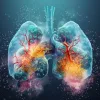Effects of Caffeine on Heart Health
Caffeine and its Impact on Heart Health
- Caffeine is a natural stimulant that is commonly consumed in various forms such as coffee, tea, energy drinks, and chocolate.
- Caffeine works by blocking the effects of adenosine, a neurotransmitter that relaxes the heart and makes you feel tired.
- When consumed in moderate amounts, caffeine can provide several benefits to heart health, including improved mental alertness, increased exercise performance, and enhanced mood.
- However, excessive consumption of caffeine can lead to negative effects on heart health, such as increased heart rate, elevated blood pressure, and irregular heart rhythm.
Positive Effects of Caffeine on Heart Health
- Mental Alertness: Caffeine consumption can enhance mental alertness and cognitive function, leading to improved focus and concentration.
- Exercise Performance: Caffeine has been shown to boost physical performance by increasing adrenaline levels and releasing fatty acids from the fat tissues, providing a source of energy for muscles.
- Mood Enhancement: Moderate caffeine intake has been associated with improved mood and reduced risk of depression.
Negative Effects of Caffeine on Heart Health
- Increased Heart Rate: High doses of caffeine can cause a rapid increase in heart rate, which may be concerning for individuals with existing heart conditions.
- Elevated Blood Pressure: Caffeine can temporarily raise blood pressure, and in some cases, may lead to persistent hypertension if consumed in excessive amounts.
- Irregular Heart Rhythm: Excessive caffeine intake has been linked to palpitations, arrhythmias, and other irregular heartbeats.
Moderation and Individual Sensitivity
- It’s important to note that individual sensitivity to caffeine can vary, and some people may experience adverse effects on heart health even with moderate consumption.
- Moderation is key, and it’s recommended to limit caffeine intake to safe levels to avoid potential negative impacts on heart health.
- Factors such as age, overall health, and pre-existing heart conditions should be considered when assessing the impact of caffeine on heart health.
Introducing Fitpaa for Holistic Health and Fitness
How Fitpaa Can Help Improve Heart Health
- Fitpaa’s comprehensive approach to health and fitness encompasses personalized metabolism monitoring and management, supported by AI-driven technology.
- The Fitpaa Capsule, tailored to individual metabolism and health goals, promotes overall well-being and supports heart health through a combination of medical therapy, nutrition, exercise, and cognitive behavior therapy.
- Fitpaa’s real-time guidance technology integrates habit-building and timely nudging from cognitive behavioral therapy to ensure consistent progress and adherence to personalized health and fitness plans.
Fitpaa’s Commitment to Guaranteed Results
- Fitpaa offers a risk-free trial and a promise of 100% money-back guarantee if the promised results are not achieved, reinforcing its commitment to the user’s satisfaction and success.
- With a lifetime validity model and goal-oriented services, Fitpaa ensures long-term support and guidance to help individuals achieve their health and fitness goals with certainty.









